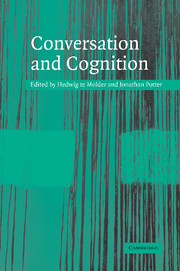Book contents
- Frontmatter
- Contents
- List of contributors
- Acknowledgements
- Transcription conventions
- 1 Talking cognition: mapping and making the terrain
- Part I The interface between cognition and action
- Part II Cognition in action
- 7 Is confusion a state of mind?
- 8 Cognition in discourse
- 9 From process to practice: language, interaction and ‘flashbulb’ memories
- 10 ‘My memory has been shredded’: a non-cognitivist investigation of ‘mental’ phenomena
- 11 Discursive psychology, mental states and descriptions
- References
- Index
11 - Discursive psychology, mental states and descriptions
Published online by Cambridge University Press: 22 September 2009
- Frontmatter
- Contents
- List of contributors
- Acknowledgements
- Transcription conventions
- 1 Talking cognition: mapping and making the terrain
- Part I The interface between cognition and action
- Part II Cognition in action
- 7 Is confusion a state of mind?
- 8 Cognition in discourse
- 9 From process to practice: language, interaction and ‘flashbulb’ memories
- 10 ‘My memory has been shredded’: a non-cognitivist investigation of ‘mental’ phenomena
- 11 Discursive psychology, mental states and descriptions
- References
- Index
Summary
Introduction
Our aim in this chapter is to show how discursive psychology (DP) deals with psychological states and characteristics. We do this in several ways: by defining what DP is, by demonstrating it analytically, and by discussing various criticisms and misunderstandings of it. As for defining it, DP works in three closely related ways:
Respecification and critique. Standard psychological topics are respecified as discourse practices. Topics recognized in mainstream psychology such as ‘memory’, ‘causal attribution’, ‘script’ knowledge, and so on, are re-worked in terms of discourse practices.We study how people ordinarily, as part of everyday activities, report and explain actions and events, how they characterize the actors in those events, and how they manage various implications generated in the act of reporting. DP often generates a critical stance on cognitive psychology. For example, cognitive theory and measurement of ‘attitudes’ is criticized and replaced by the study of argumentative and evaluative practices in discourse (Billig, 1987; Potter, 1998a; Potter and Wetherell, 1987; Wiggins, 2002; Wiggins and Potter, 2003). Similarly, cognitive methods and theory on ‘causal attribution’ are critically opposed by analyses of how people manage accountability in everyday talk (Antaki, 1994; Edwards and Potter, 1992a, 1993).
The psychological thesaurus. DP explores the situated, occasioned, rhetorical uses of the rich common sense psychological lexicon or thesaurus: terms such as angry, jealous, know, believe, feel, want, and so on. For example, expressions such as ‘I don't know’, or ‘your angry stage’ are examined for the local contrasts and interactional work for which they are used (e.g., Edwards, 1995; Potter, 1998b). By grounding such studies in empirical materials, we are able to explore the ways in which concepts such as ‘know’ or ‘angry’ are used interactionally and rhetorically, with regard to specific, locally relevant alternative descriptions. We develop some examples in this chapter.
- Type
- Chapter
- Information
- Conversation and Cognition , pp. 241 - 259Publisher: Cambridge University PressPrint publication year: 2005
- 164
- Cited by



